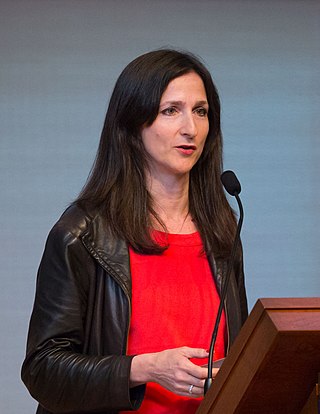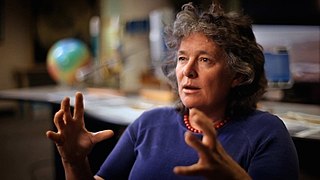Related Research Articles

A terrestrial planet, telluric planet, or rocky planet, is a planet that is composed primarily of silicate rocks or metals. Within the Solar System, the terrestrial planets accepted by the IAU are the inner planets closest to the Sun: Mercury, Venus, Earth and Mars. Among astronomers who use the geophysical definition of a planet, two or three planetary-mass satellites – Earth's Moon, Io, and sometimes Europa – may also be considered terrestrial planets. The large rocky asteroids Pallas and Vesta are sometimes included as well, albeit rarely. The terms "terrestrial planet" and "telluric planet" are derived from Latin words for Earth, as these planets are, in terms of structure, Earth-like. Terrestrial planets are generally studied by geologists, astronomers, and geophysicists.

In astronomy and astrobiology, the habitable zone (HZ), or more precisely the circumstellar habitable zone (CHZ), is the range of orbits around a star within which a planetary surface can support liquid water given sufficient atmospheric pressure. The bounds of the HZ are based on Earth's position in the Solar System and the amount of radiant energy it receives from the Sun. Due to the importance of liquid water to Earth's biosphere, the nature of the HZ and the objects within it may be instrumental in determining the scope and distribution of planets capable of supporting Earth-like extraterrestrial life and intelligence.

Planetary habitability is the measure of a planet's or a natural satellite's potential to develop and maintain environments hospitable to life. Life may be generated directly on a planet or satellite endogenously or be transferred to it from another body, through a hypothetical process known as panspermia. Environments do not need to contain life to be considered habitable nor are accepted habitable zones (HZ) the only areas in which life might arise.
Mark A. Cane is an American climate scientist. He obtained his PhD at MIT in 1975. He is currently the G. Unger Vetlesen Professor of Earth and Climate Sciences at Columbia University and the Lamont Doherty Earth Observatory. He actively pursues several research and teaching initiatives, and supports the Columbia climate kids corner. As of November 11, 2015, his publications have been cited over 22,600 times, and he has an h-index of 75.

Maria T. Zuber is an American geophysicist who is the vice president for research at the Massachusetts Institute of Technology, where she also holds the position of the E. A. Griswold Professor of Geophysics in the Department of Earth, Atmospheric and Planetary Sciences. Zuber has been involved in more than half a dozen NASA planetary missions aimed at mapping the Moon, Mars, Mercury, and several asteroids. She was the principal investigator for the Gravity Recovery and Interior Laboratory (GRAIL) Mission, which was managed by NASA's Jet Propulsion Laboratory.

Sara Seager is a Canadian–American astronomer and planetary scientist. She is a professor at the Massachusetts Institute of Technology and is known for her work on extrasolar planets and their atmospheres. She is the author of two textbooks on these topics, and has been recognized for her research by Popular Science, Discover Magazine, Nature, and TIME Magazine. Seager was awarded a MacArthur Fellowship in 2013 citing her theoretical work on detecting chemical signatures on exoplanet atmospheres and developing low-cost space observatories to observe planetary transits.
Jonathan I. Lunine is an American planetary scientist and physicist. Lunine teaches at Cornell University, where he is the David C. Duncan Professor in the Physical Sciences and chair of the Department of Astronomy. Having published more than 380 research papers, Lunine is at the forefront of research into planet formation, evolution, and habitability. His work includes analysis of brown dwarfs, gas giants, and planetary satellites. Within the Solar System, bodies with potential organic chemistry and prebiotic conditions, particularly Saturn's moon Titan, have been the focus of Lunine's research.

David H. Grinspoon is an American astrobiologist. He is Senior Scientist at the Planetary Science Institute and was the former inaugural Baruch S. Blumberg NASA/Library of Congress Chair in Astrobiology for 2012–2013.
James Anthony Jackson CBE FRS is Professor of Active Tectonics and head of Bullard Laboratories, Department of Earth Sciences, Cambridge University. He made his name in geophysics, using earthquake source seismology to examine how continents are deformed. His central research focus is to observe the active processes shaping our continents.

Frances "Fran" Bagenal is a Professor Emerita of Astrophysical and Planetary Sciences at the University of Colorado Boulder and a Senior Research Scientist at the Laboratory for Atmospheric and Space Physics in the fields of space plasmas and planetary magnetospheres.
Kunchithapadam Gopalan is an Indian geochronologist and a former emeritus scientist at National Geophysical Research Institute. He is known for his studies on the chronologies of critical rock suites of the Indian subcontinent and is an elected fellow of the Indian Academy of Sciences, Indian National Science Academy, Indian Geophysical Union and the National Academy of Sciences, India. The Council of Scientific and Industrial Research, the apex agency of the Government of India for scientific research, awarded him the Shanti Swarup Bhatnagar Prize for Science and Technology, one of the highest Indian science awards for his contributions to earth, atmosphere, ocean and planetary sciences in 1982.

Rengaswamy Ramesh (1956–2018) was an Indian climatologist, oceanographer, a former Prof. Satish Dhawan Professor at the Physical Research Laboratory and a senior professor at the National Institute of Science Education and Research, Bhubaneswar. He was known for paleo-climatic and paleo-oceanographic studies and was an elected fellow of all the three major Indian science academies viz. Indian National Science Academy, Indian Academy of Sciences, and the National Academy of Sciences, India as well as of The World Academy of Sciences. The Council of Scientific and Industrial Research, the apex agency of the Government of India for scientific research, awarded him the Shanti Swarup Bhatnagar Prize for Science and Technology, one of the highest Indian science awards for his contributions to Earth, Atmosphere, Ocean and Planetary Sciences in 1998.
Norman H. Sleep is an American geophysicist and professor of geophysics at Stanford University. He has done internationally recognized research on plate tectonics and many other areas of geology and planetology.
Arlene M. Fiore is an atmospheric chemist whose research focuses on issues surrounding air quality and climate change.
Penelope King uses geochemistry and cosmochemistry to study planetary processes to better understand past and future planetary environments, and what this information may tells us about climate change. She is a professor at the Australian National University (ANU) in the Research School of Earth Sciences (RSES). King holds many awards, including Fellow of the American Geophysical Union and the Mineralogical Society of America in 2019, and winning the AGU Joanne Simpson Medal for Mid-Career Scientists the same year. She currently leads a research group examining surface and interior processes on planetary bodies.
M. Joan Alexander is an atmospheric scientist known for her research on gravity waves and their role in atmospheric circulation.
Thorne Lay is an American seismologist. He was born in Casper, Wyoming in 1956, and raised in El Paso, Texas. He is a professor of earth and planetary sciences at the University of California, Santa Cruz.
James E. Owen is an astrophysicist at Imperial College London who studies exoplanets and accretion disks.
Nicolas Dauphas is a planetary scientist and isotope geochemist. He is faculty in the Department of the Geophysical Sciences and Enrico Fermi Institute at the University of Chicago. His research focuses on isotope geochemistry and cosmochemistry. He studies the origin and evolution of planets and other objects in the solar system by analyzing the natural distributions of elements and their isotopes using mass spectrometers.
References
- ↑ Abbot, Dorian Schuyler (2008). A high-latitude convective cloud feedback (Ph.D. thesis). Harvard John A. Paulson School of Engineering and Applied Sciences. OCLC 934916756.
- 1 2 Abbot, Dorian. "Curriculum Vitae" (PDF). University of Chicago. Archived (PDF) from the original on 2021-10-16. Retrieved 2021-10-20.
- ↑ "Dorian Abbot". People. University of Chicago Geophysical Sciences. Retrieved 2021-10-20.
- ↑ Flaherty, Colleen (19 October 2021). "MIT deals with fallout from canceled lecture". Inside Higher Ed. Archived from the original on 2021-10-19. Retrieved 2021-10-20.
- ↑ Sobey, Rick (5 October 2021). "MIT cancels professor lecture after backlash against him, university cites 'distractions'". Boston Herald. Archived from the original on 2021-10-06. Retrieved 2021-10-20.
- ↑ Abbot, Dorian S.; Marinovic, Ivan (12 August 2021). "The diversity problem on campus - Opinion". Newsweek. Retrieved 2021-10-29.
- ↑ Knott, Matthew (22 October 2021). "When Dorian Abbot's MIT lecture was cancelled, it lit a free-speech firestorm about diversity". The Sydney Morning Herald. Retrieved 2021-10-29.
- ↑ Powell, Michael (20 October 2021). "M.I.T.'s Choice of Lecturer Ignited Criticism. So Did Its Decision to Cancel". The New York Times. Archived from the original on 2021-10-20. Retrieved 2021-10-25.
- ↑ Schmidt, Martin (7 October 2021). "Letter to the community from MIT provost". MIT. Archived from the original on 2021-10-11. Retrieved 2021-10-24.
- 1 2 Mayberry, Carly (12 October 2021). "Geophysicist 'Canceled' by MIT Honored With Award While Thousands Register for His Lecture". Newsweek. Archived from the original on 2021-10-12. Retrieved 2021-10-28.
- ↑ Creitz, Charles (20 October 2021). "Professor Dorian Abbot: I was canceled for basing admissions on merit". Fox News. Archived from the original on 2021-10-21. Retrieved 2021-10-28.
- ↑ "Politics overshadowing scientific work". CNN. 23 October 2021. Retrieved 2021-10-29.
- ↑ "MIT Free Speech Alliance (MFSA)". MIT Free Speech Alliance. MIT Free Speech Alliance. Archived from the original on 2021-11-06. Retrieved 2023-05-06.
The barrage of negative press and public outrage resulting from MIT cancelling Dr. Abbot ...
{{cite web}}: CS1 maint: bot: original URL status unknown (link) - ↑ Peter Bonilla and Eric Rasmusen (ed.). "MIT Faculty Vote to Accept New Free Expression Statement Supported by MIT Free Speech Alliance". MIT Free Speech Alliance (Press release). MIT Free Speech Alliance. Archived from the original on 2023-05-06. Retrieved 2023-05-06.
- ↑ Peter Bonilla (ed.). "First of-Its-Kind Debate on a U.S. Campus of Diversity-Equity-Inclusion Occurs Peacefully at MIT". MIT Free Speech Alliance (Press release). MIT Free Speech Alliance. Retrieved 2023-05-06.
- 1 2 3 4 5 6 "Google Scholar". scholar.google.com. Retrieved 2021-11-02.